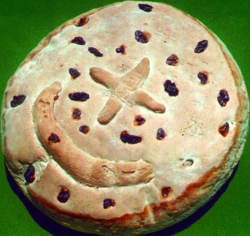September
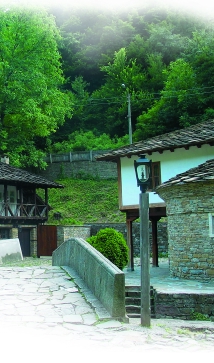 In
the calendar of the Roman Empire, in which the first month belongs to
the god of war – Mars, the seventh one is called September, from
the Latin septimus. But after the calendar reform in 46 BC, September
became the ninth month. Old Russians
In
the calendar of the Roman Empire, in which the first month belongs to
the god of war – Mars, the seventh one is called September, from
the Latin septimus. But after the calendar reform in 46 BC, September
became the ninth month. Old Russians
called September kresnin, ossen or siven, the proto-Bulgarians called
it ruyan or zarev month. The Ukrainians call it maik or serpen.
People in Bulgaria call it also “grape-picking month”.
1 September SIMEONOVDEN (Simeon’s Day)
This is the beginning of the church New Year.
On this day the autumn sowing starts.
Early in the morning the woman of the
house cleans the house, rubs the planks on
the floor with wood ashes, takes the clothes
out into the sun and sweeps the grain in the
barn. It is believed that if the house is clean
the grain will be good during the next year.
Then she kneads a ritual round loaf and the
cloth through which the water is strained is
soaked with St. George’s Day dew. With this
bread she will feed the oxen and the man of
the house. Then she puts the oxen into the harness and lights a candle
on their horns.
She throws a plate of wheat in front of the animals, wheat from the one
incensed on
Voditzi and the rest is mixed with the grain ready for sewing, to put
strength in it. In the
bushel she puts a red egg that she has kept from Easter to be buried in
the first furrow in
the field for fertility. The name Simeon comes from the Hebrew Shimon,
which means ‘hearing of
the wish’.
8 September MALKA BOGORODITSA (Virgin Mary’s Day)
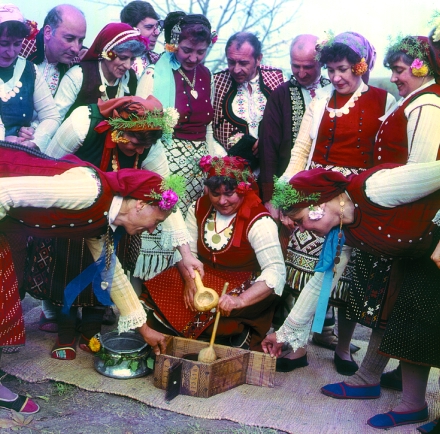 On
the eve of the holiday those who are ailing make an oath. How do you do
that?
On
the eve of the holiday those who are ailing make an oath. How do you do
that?
First the Virgin Mary bread is made, decorated with a bride’s bracelet.
On it is put an
Easter “doll” – covered with honey. After it is baked,
the sick man breaks the bread. He
throws the first piece through the chimney and eats the second, saying
for example: “As
long as I live I’ll not put goat meat in my mouth. For the illness
– a honey bread, for me – cure and health!” Then he
pours some
red wine from a clay bowl for the illness and the rest he drinks himself.
Old people believe that after that the illness goes away, but they know
that “an oath
should not be broken till the grave!”
14 September KRASTOVDEN (Holy Cross Day)
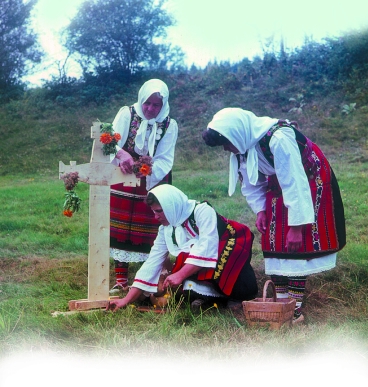 According
to the folk calendar from
According
to the folk calendar from
Holy Cross Day people get ready for grapegathering.
They repair the hoops of the
kegs in which the wine will be poured, the
wheelbarrow to carry the grapes and the
vessel to press it. Of course, baskets are
woven for the grape-pickers – big and
small. That is why in some places Holy
Cross Day is called “Grape-picker”.
This is the nameday of Krastyo, Krastina.
16 September. Nameday of Lyudmil, Lyudmila (meaning ‘dear, loved by people’).
17 September VYARA, NADEZHDA, LYUBOV
(Faith, Hope and Love)
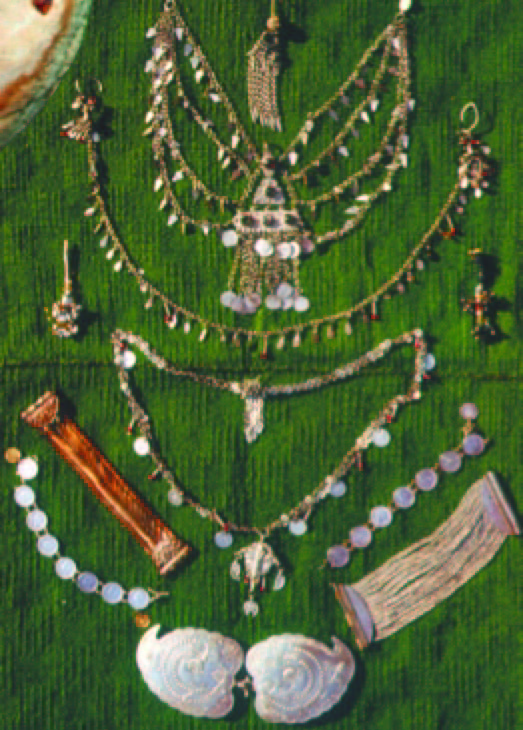 The
Bulgarians celebrate this day as the
The
Bulgarians celebrate this day as the
day of love. People give fresh white flowers
to their beloved, light candles in church so
that faith, hope and love are kindled in every
home.
The nameday of Lyuben, Lyubomir,
Lyuba, Sophia, Nadezda, Vyara.
